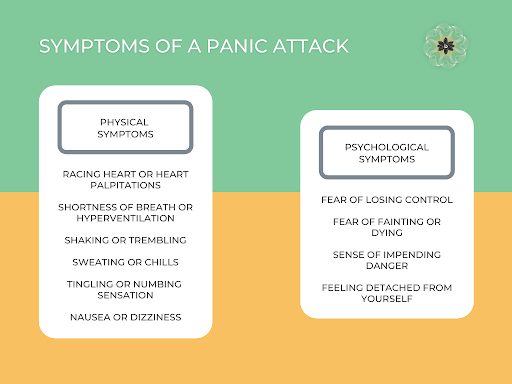Panic can happen when we least expect it.
You may be driving to work, about to get in the shower, or in line at the store, and all of a sudden… There it is—a feeling of intense fear that shows up out of nowhere, disarming you both physically and mentally. You may struggle with shortness of breath, a pounding heartbeat, and dizziness. Sweat might drip down your neck, and your body may start to tingle. A high surge of nervous energy and lack of control may overwhelm you. Talking or moving can feel virtually impossible.
You feel petrified even though there is no real danger. Terrifying thoughts may cross your mind: Am I having a heart attack, or am I going crazy? Is this what dying feels like? Then, after a few minutes, the wave subsides, and the symptoms dwindle. But you might remain scared and confused, unsure whether this would happen again or what to do if it does.
If you suffer from panic attacks, please remember you are not alone. Like you, many suffer from these frightening experiences. But you don’t have to. With the right support and care, you can learn to overcome panic and live well again. Here at Madison Park Psychological Services, we offer therapy for panic attacks to help the NYC community find serenity and peace. If you are ready to get started, contact us to schedule an appointment today.
A panic attack is an intense and abrupt rush of anxiety, fear, or terror that heightens and peaks within minutes (from five to 15 minutes or more). Panic attacks can affect anyone. They can be recurring or occasional and may be triggered by stressful events or happen suddenly. They can also be a symptom of mental health or medical conditions (i.e., anxiety, thyroid issues, heart or respiratory problems).
Suffering from a panic attack does not always mean you have a panic disorder. People with panic disorder experience sudden and recurring panic attacks. They tend to worry about having more episodes in the future and actively try to avoid situations that may prompt them. Fear of and preparation to avoid panic attacks may actually make things worse. For example, you may experience work or school-related difficulties, relationship issues, and withdrawal from others to prevent panic from happening. Rather than trying to avoid panic altogether, you can learn to overcome it.

Common symptoms of a panic attack include:
If you have exhibited any of these signs, you might have experienced a panic attack. Now, if your panic attacks are happening unexpectedly and often, causing you to evade certain people, places, or activities, you may be suffering from a panic disorder. Talk to your doctor or book a consultation with us to get an accurate evaluation and find the help you deserve.
Talk therapy or counseling can help you with panic attacks by:
You can address the symptoms of a panic attack by practicing the following:
Becoming aware of what’s going on in your body and mind will help you recognize panic attack symptoms and remind yourself that this will pass. Then, through techniques like grounding, visualization, body scanning, and meditation, you can bring your attention to the present moment without desperation or judgment.
Taking deep inhales and exhales, counting breaths, and other exercises can help you address the hyperventilation that may come with a panic attack, slowly restoring your breathing rhythm and calming your nervous system.
Techniques such as progressive muscle relaxation can help you relieve body tension and regain a sense of control. By tensing and releasing specific muscles in line with your breath, you can lower stress and anxiety.
Your therapist can teach you these and other self-help strategies as part of your treatment. The more you practice them in and out of therapy, the more effective they will be when panic strikes. Additionally, implementing certain lifestyle changes such as having a balanced diet, doing regular physical activity, and spending time with friends and family can also help regulate your anxiety levels.
If your partner, loved one, or friend is having a panic attack, you can help them by:
At Madison Park Psychological Services, we offer therapy for panic attacks to help you navigate these scary episodes and find the balance you desire. We provide a tailored approach to teens and adults in NYC, combining Eastern and Western traditions. Our licensed staff uses Cognitive Behavioral Therapy (CBT) and other evidence-based modalities to address these debilitating symptoms. Treatment begins with a consultation. We will gather your information to pair you with the best therapist and therapy modality according to your needs.
Our therapy services are delivered online through teletherapy. If you or your loved ones are experiencing panic attacks, we are here to support you. We can help you regain control and stillness for a peaceful life. Ready to get started? Call us at 212-506-5935 or contact us to book an appointment.
We’ll design an effective, individually tailored treatment to help you reach optimal health and well-being.
To contact us or book an appointment, please complete the form below.